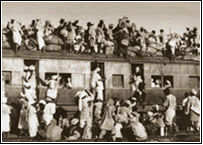Old wounds
By: Shagufta Yasmeen
Dawn: November 11, 2007
 ‘Fifty years after that fateful day, as I sit down to write these lines, I wonder which was the greater casualty: the loss of millions of lives and the uprooting of many more from their homes, or the loss of compassion in me and in other people. Compassion is the trait that distinguishes humans from animals. How many survivors of partition, from all faiths, could have retained this after experiencing so much terror and anguish?’ wrote Satish Gujral in his article entitled ‘I suffered from what I witnessed’. ‘Fifty years after that fateful day, as I sit down to write these lines, I wonder which was the greater casualty: the loss of millions of lives and the uprooting of many more from their homes, or the loss of compassion in me and in other people. Compassion is the trait that distinguishes humans from animals. How many survivors of partition, from all faiths, could have retained this after experiencing so much terror and anguish?’ wrote Satish Gujral in his article entitled ‘I suffered from what I witnessed’.
The partition of the subcontinent became a reality on August 14, 1947. Many writers have penned their views in books dealing with the subject. They have cited the evidence necessary to justify this separation; outlining the political, religious and social reasons in favour of dividing the subcontinent. In Freedom at Midnight, Larry Collins and Dominique Lapierre reconstructed the events leading up to the fateful day. While discussing the jubilant mood of many people on that day they also mention that ‘For many Indians, the night they and their countrymen had dreamed of for years was a frightful horror. To Lieutenant Colonel J.T. Sataravala, a Parsi of the Frontier Force Rifles, it would always be associated with the most sickening sight his war-hardened eyes had ever seen. It was the gruesome mutilated bodies of an entire Hindu family in a flaming ruin in Balochistan city of Quetta. Another incident showed the other side of the story: in Amritsar, while the city’s new authorities dutifully performed their independence rituals at the city’s old Mughal fortress, an enraged horde of Sikhs was ravaging a Muslim neighbourhood less than a mile away. They slaughtered its male inhabitants without mercy or exception. The women were stripped, repeatedly raped, then paraded shaking and terrified through the city to the Golden Temple, where most had their throats cut.’
Such was the suffering of people on both sides of the new border and Partition: surgery without anaesthesia edited by Anees Jillani recounts the experiences of people whose minds still bear clear images of the massacre. Humanity suffered extensively in the hands of those who call themselves human beings. History reveals truth, and the truth is that readers need more books like this one to understand and pledge that such brutality in the name of politics and religion cannot be accepted.
History reveals truth, and the truth is that readers need more books like this one to understand and pledge that such brutality in the name of politics and religion cannot be accepted. Humanity has suffered extensively in the hands of those who call themselves human beings.
It is said that disasters bring out the best and worst in humans, and what worst form of disaster can there be than the uprooting of families from their cities, villages and homes? They had been living there for generations; their relationships with the other communities were very cordial — who could have envisaged the scenario that unfolded itself on that fateful day? Yet the book also unravels the compassion shown by Muslims, Hindus and Sikhs for each other. A variety of articles have been selected, and each one of them reveals an individual perspective held by the respective writer. Satish Gujral, Khushwant Singh, Dr M. S. Jillani, Pran Neville, Hafizur Rahman and many others have shared their experiences with the readers of this compilation. Each experience awakens a memory that is etched in the mind of the person who has lived through it. Khushwant Singh very rightly points out in his write-up: ‘in spite of all this, there is something in me that tells me that this cannot go on. Very soon the younger generation will see that they have been let down very badly and I am sure very soon we will see leaders with greater calibre and loyalty.’
Partition: Surgery without anaesthesia is a book of great importance as it reveals what intolerance and hatred can lead to. By citing examples from narratives of history, and from the book of life as seen by many, this book recounts that the result of brutality and abhorrence is more brutality and abhorrence. The message is loud and clear: people need love, respect and compassion, and the future generation can learn tremendously from the experiences of the older generation. Reading about the pain and sufferings of countless people can hopefully bring about a change. The world needs this change more now than ever before — it cannot allow humans to turn into animals; their humane side has to be nurtured so that it becomes easy for them to understand and feel the pain and suffering of others.
The work is a compilation worth reading. It enables one to realise the mistakes committed and to resolve that love and care should at all cost replace hatred and savagery.
Partition: Surgery without anaesthesia
Edited by Anees Jillani
SPARC, Karachi
ISBN 978-969-8616-16-8
153pp. Rs100 |
![]()